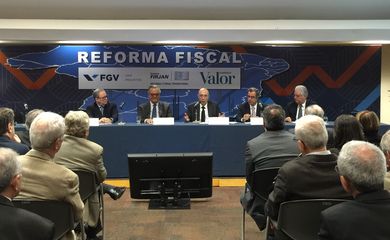Brazil interim govn't: bill not to reduce funds for education and health care
Through Eduardo Guardia, executive secretary of the Finance Ministry, the interim government pledged today (Aug. 30) that there will be no reductions in the funds earmarked for education and health care after the approval of constitutional amendment bill 241, currently under deliberation at the lower house.

The secretary was participating in a meeting with government authorities today (Aug. 30) in which he explained that “health care and education are protected under the terms of the constitutional norms currently in effect. So [the government] cannot go below what has been set as the floor for health care and education after the approval of this bill. The job of the Legislative branch, as we all know, is to deliberate on the allocation of spending within the global limit stipulated for each of the powers of the republic, keeping the minimum limits earmarked for education and health care preserved,” he said.
Resistance
The secretary's explanation is an attempt to keep at bay congress members' resistance to possible reductions in these areas. In his view, in the present scenario, funding for these sectors depend on the economic factors and are tied to government revenues.
Eduardo Guardia noted that, when a crisis sets in, as is the case in the country today, with revenues on the wane, no protection is provided for education and health care.
Guardia says that the bill takes as its starting point the minimum from the year before, after which amounts are adjusted for inflation. “Whether you're winning or losing depends much on the scenario you're working in. In a receding scenario where nothing gets done and revenue is declining, you're not offering health care and education any protection,” Guardia argued.
The secretary went on to say that the Legislative fully understands Brazil's economic landscape and the importance of having this change in the fiscal regime approved. “We believe there is considerable support due to the difficulties facing the country and the importance of this measure, which was designed to overcome the crisis we're going through,” added Guardia, who was secretary of the National Treasury under ex-President Fernando Henrique Cardoso.
Federal Deputy Darcísio Perondi, the head of a commission on the proposed piece of legislation, also assured there will be no cuts in education and health care.
“No cuts, reductions or freezing. The National Broad Consumer Price Index [used by the government to set the target for inflation] should accrue on what was spent this year or pawned,” he explained.
Perondi said that, in a country that has reported three primary deficits, a surplus should be expected in three or four years.
Translated by Fabrício Ferreira
Fonte: Brazil interim govn't: bill not to reduce funds for education and health care




